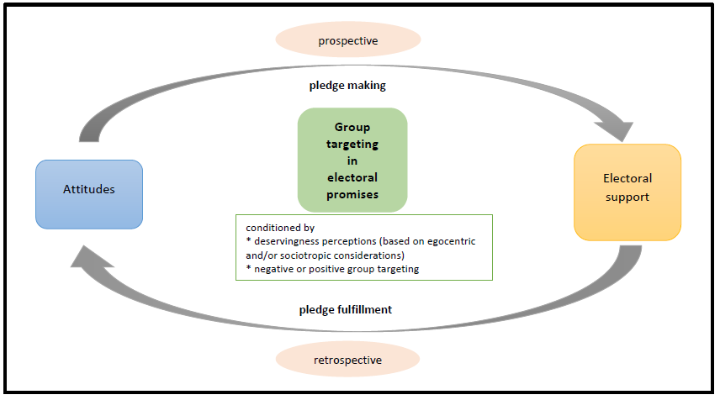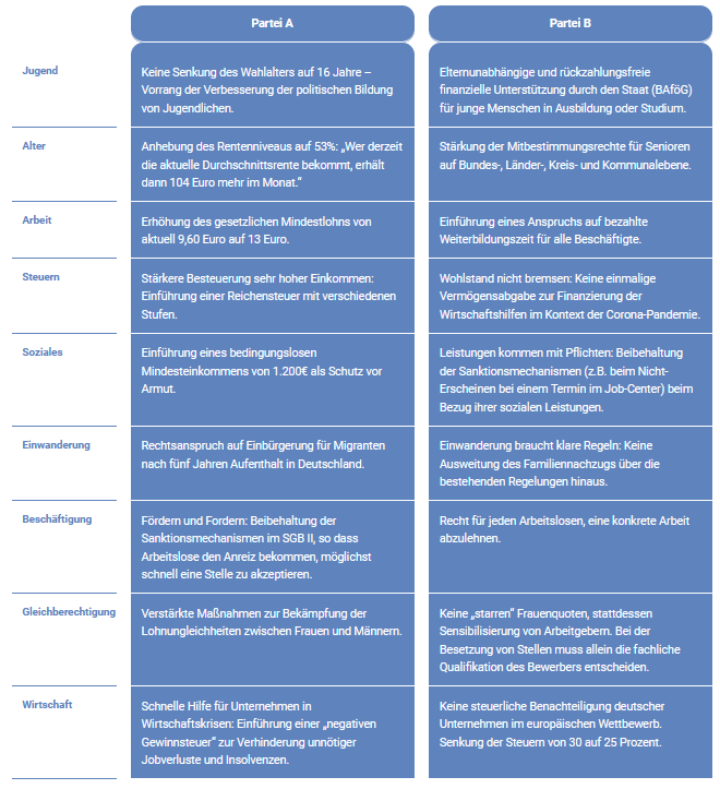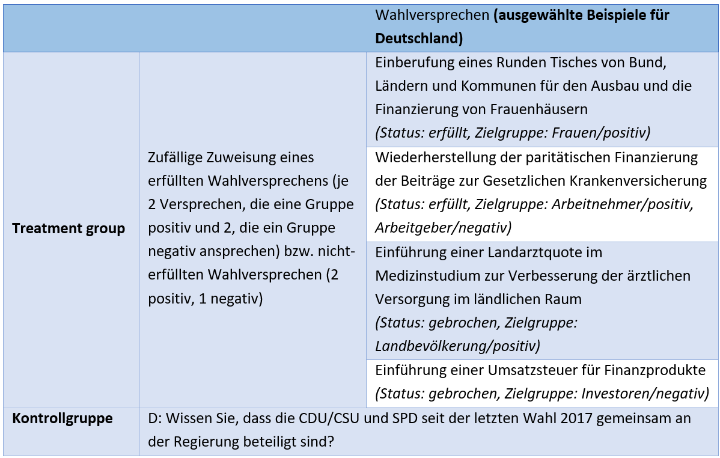Project title:
Group targeting and citizens’ responses to electoral promises and their realization (GROUPTA)
Duration:
10/2021 – 09/2023
Funding:
Deutsche Forschungsgemeinschaft
Principal investigator:
Dr. Elisa Deiss-Helbig
Project team:
Dr. Isabelle Guinaudeau (Sciences Po Bordeaux)
Dr. Theres Matthieß (Mannheimer Zentrum für Europäische Sozialforschung)
Prof. Dr. André Bächtiger (Universität Stuttgart)
Project description:
In our project, we analyze under what conditions citizens support party manifestos in general and electoral promises in particular (prospective) and how they respond to the fulfilment (and breakage) of electoral promises (retrospective). We focus on the influence of group targeting in electoral promises and ask whether the citizens’ evaluation and response to electoral promises depends on whether they are personally affected, or based on the deservingness of the groups affected.
Research on social groups and group belongings has a long tradition in political science. However, we still know very little about whether and how voters respond to group appealing or targeting in electoral manifestos, depending on whether their group belonging or deservingness perceptions of the groups affected. There is also a lack of empirical evidence on the extent to which responses to the fulfillment or breaking of electoral promises depend on the specific group for which the promise was made. The promises contained in the electoral manifestos of parties or candidates are addressed to different social groups in different ways. Each citizen may therefore use multiple group-based heuristics to compare party platforms that appeal to different groups in positive or negative ways. We argue that these heuristics influence not only citizens’ evaluation of the electoral offer and their (prospective) choice between different programs, but also their (retrospective) evaluation of the incumbent parties' performance in fulfilling or breaking electoral promises.
GROUPTA will make a crucial contribution to this research agenda by answering the following research questions based on an online survey conducted during real electoral campaigns in two different political contexts – France and Germany:
- Do voters respond to campaign communication about current pledges (prospective) and the fulfilment or breakage of past pledges (retrospective) by the incumbent government based on whether they are personally affected, or based on the deservingness of the groups affected, regardless of whether they belong to these groups or not?
- Does targeted policy affect also more fundamental attitudes towards the political system and citizens’ propensity to vote at elections?
The centerpiece of this project is an approximately 25-minute online survey conducted in the run-up to the 2021 federal election in Germany and the 2022 presidential election in France. The survey will be conducted in both countries by the same survey institute (Psyma) and will include approximately 6,000 respondents each in Germany and in France. The sample is the population eligible to vote in both countries. In addition to general questions on political attitudes, questions on the "deservingness perceptions" of selected groups and on the assessment of the implementation of election promises, the core elements of the survey are a paired-conjoint experiment and a simple survey experiment.
In the paired-conjoint experiment, respondents will be shown a series of tables presenting pairs of hypothetical sets of pledges resembling the summaries of party manifestos (see as an example from the German survey the graph above) (similar to Horiuchi et al., 2018) published commonly in the media, press, social networks and communication of candidates in the run-up to elections. To increase the external validity of the experiment, the promises are taken from the real electoral manifestos for the 2021 federal election and the 2022 presidential election in France, respectively. The promises target (positively or negatively) each of the following nine selected target groups (attributes) - represented in the survey as policy fields (see graph above):
- Poor people
- Affluent people
- Enterprises
- Employed people
- Unemployed people
- Young people
- Senior citizens
- Women
- Immigrants
For each group, two promises are taken from the electoral manifestos that appealed positively to the group (i.e., included benefits for members of that group) and two that appealed negatively to the group (i.e., included material/ideal costs for members of that group) (attribute levels). Respondents are shown four juxtapositions (conjoint tables) in sequence. For each of these comparisons, respondents are asked which of the two parties they would rather vote for (choice based) and how appealing they find the respective party program (rating based).
The paired-conjoint experiment will allow us to analyze under which conditions voters support electoral manifestos and whether this depends on their own concern (egocentric) or also on "deservingness perceptions" of the groups addressed in the election pledges.
In the survey experiment, respondents in the treatment group are shown one of seven real election pledges from the coalition agreement of the last federal government (19th legislative period) (see table for the selection of pledges in Germany) or, for the case of France, the election program of the current French president and told the fulfilment status of the promise (fulfilled/broken). Respondents were then asked whether they were surprised that this promise had been fulfilled or broken. Respondents in the control group are given information about the composition of the current government in Germany or the president in France.
It is worth highlighting that we are not primarily interested in whether the respondents are aware of the fulfilment or breakage of the selected pledges. Similar to Naurin et al. (2019) in the Swedish context and following the policy feedback literature, we focus on the effects of our treatment on evaluations of government performance as well as on more fundamental attitudes toward the political system and willingness to participate in the next election.
We will present the first two papers from the GROUPTA project at the EPSA Conference in Prague (June, 23-25 2022).
The first paper deals with deservingness perceptions of social groups. Making use of survey data gained through the online survey that was conducted as part of the GROUPTA project shortly before the last German federal election, we explore the homogeneity as well as the individual determinants of the deservingness perceptions.
Abstract
The relevance of “deservingness perceptions” is well established in research on public opinion towards social policy. This literature points to a universal rank order of groups that are perceived as more or less deserving or not deserving at all. However, the focus on group characteristics believed to determine deservingness implies that little attention has been paid to the possibility that deservingness perceptions are contentious. We argue that a majority of groups will probably feature a more contrasted profile and that, depending on their political ideology and group membership, individuals are likely to weight deservingness criteria differently. The findings of an online survey conducted among more than 5,500 German respondents support these assumptions.
EPSA-Panel "Inequality, Redistribution and Deservingness"
The second paper is a survey experimental test on voters' reactions to group targeted pledge performance. By relying on data gained through a survey experiment in which respondents were informed about fulfilment or breakage of one pledge extracted from the coalition agreement of the last Grand coalition (2017-2021), we ask how pledge support and being member of a group that is targeted by a pledge affect retrospective pledge voting.
Abstract
When and how do voters respond to group targeted pledge (non-)fulfilment? While research on the reasons why pledges are (not) fulfilled has been growing in the last couple of years, voters' reactions to government pledge fulfilment is still understudied. Previous research on citizens' retrospectively oriented reactions has mainly focused on studying the effects of a government's performance (sociotropic or egocentric) unrelated to election pledges. While there is initial evidence that voters punish governments for breaking their pledges, we still lack knowledge to which kind of pledges voters respond in a positive or negative way. We acknowledge the growing importance of group targeting and mobilization, i.e., the fact that parties make election pledges addressing specific groups of voters positively or negatively, such as business owners or migrants. We argue that policy consistency and group membership strengthens retrospective pledge voting. To test these expectations, we rely on a survey experiment based on real broken or fulfilled election pledges conducted during the election campaign for the 2021 legislative elections in Germany (N > 5,000). We find evidence that pledge breakage is punished, but there is not reward of pledge fulfilment - this pattern does not change if citizens' self-interest (group membership) is taken into account. This provides evidence that retrospective pledge voting is less about policy gains or losses, but more about citizens' trust in parties to be reliably and competent actors.
EPSA-Panel "Retrospective Voting and Accountability"
Elisa Deiss-Helbig
Dr.Research Fellow




